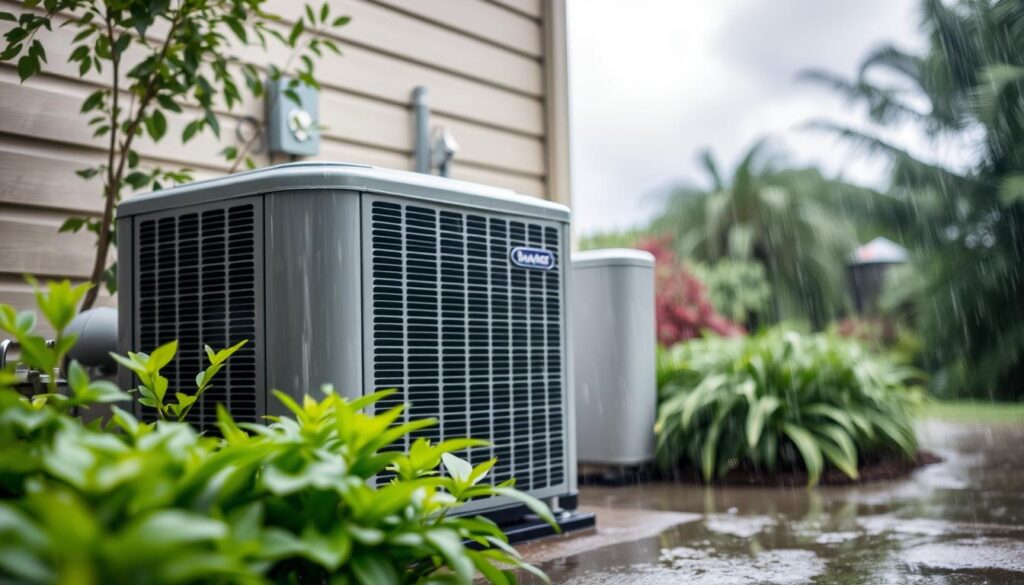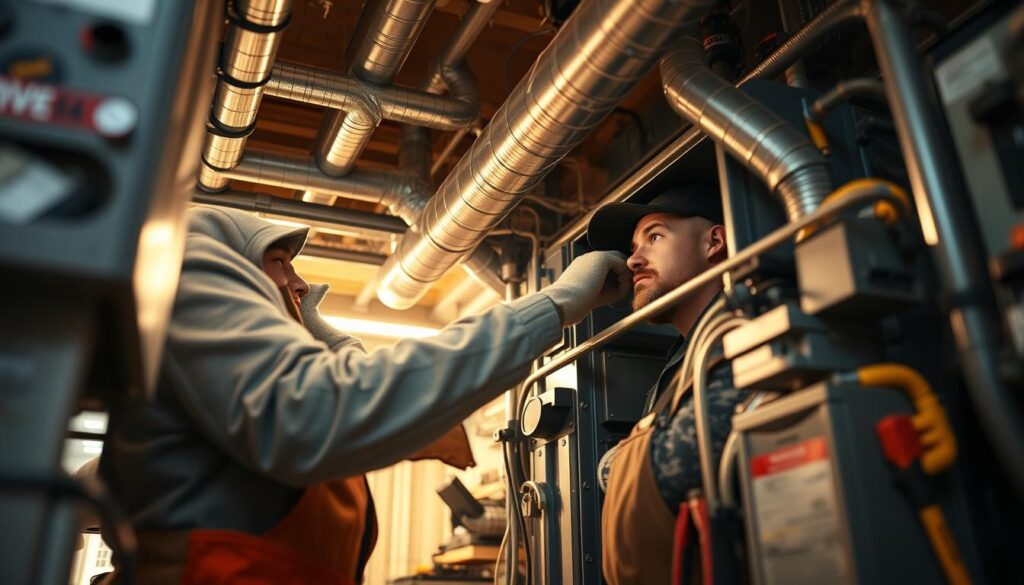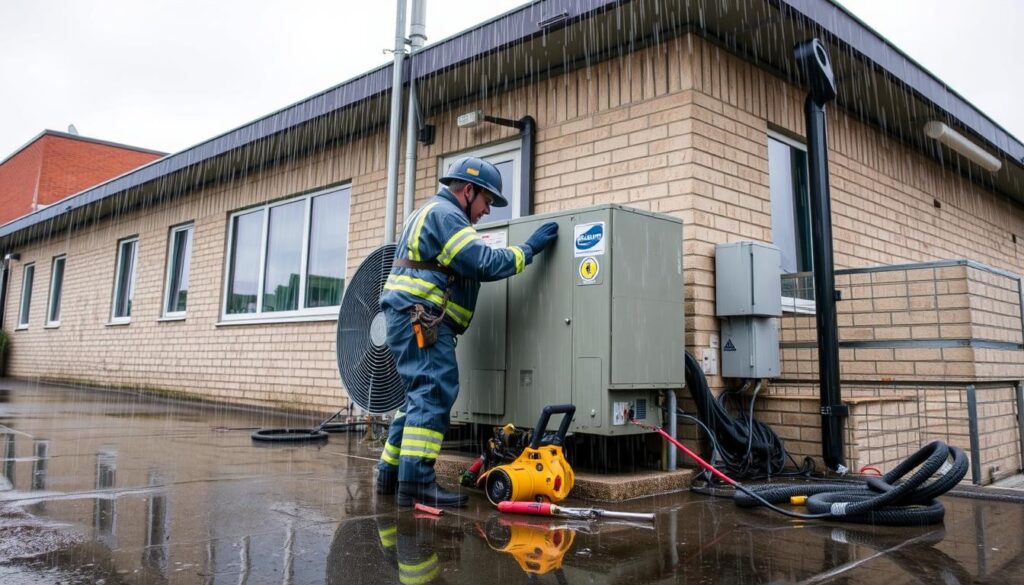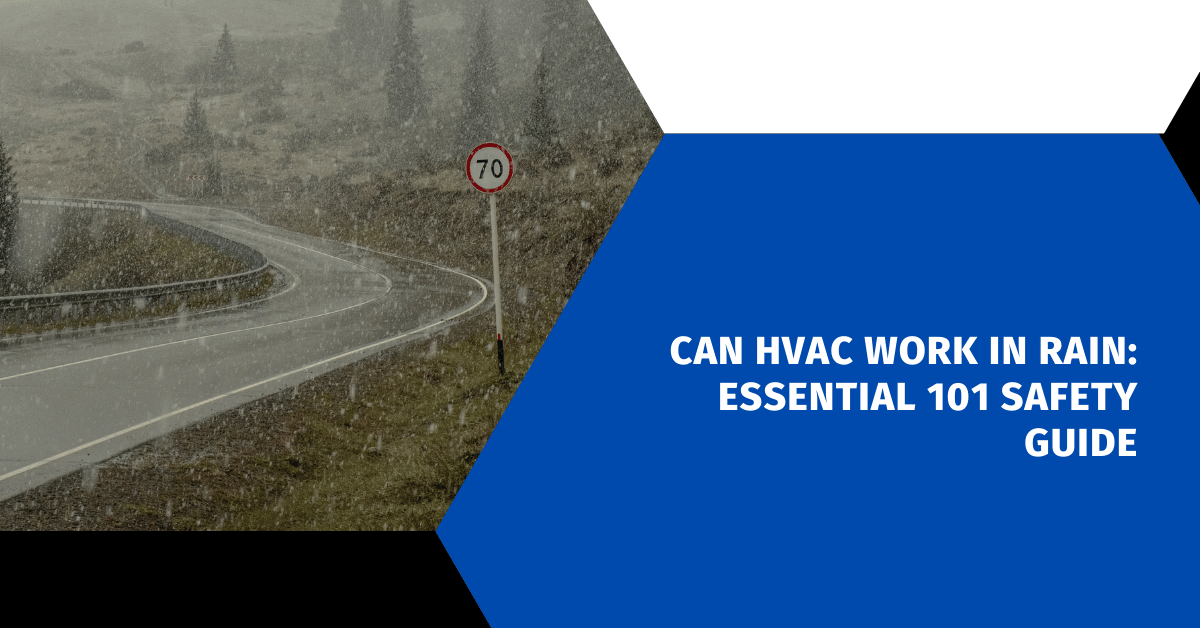Affiliate Disclosure
HVAC Guide Guys is a participant in the Amazon Services LLC Associates Program, an affiliate advertising program designed to provide a means for sites to earn advertising fees by advertising and linking to Amazon.
Can HVAC Work in Rain? When it rains, you might wonder if your HVAC system can handle it. The answer is not simple. Working on HVAC systems in the rain comes with its own set of safety risks. Even light rain can pose challenges, making it crucial to take the right precautions.
Keeping everyone safe is the top priority in the HVAC field, especially when dealing with electrical parts in wet weather. Technicians need to evaluate the risks, wear the right protective gear, and stick to safety guidelines. This way, they and the equipment can stay safe, even when it’s raining heavily.

Key Takeaways
- HVAC work in the rain requires specialized safety protocols to protect technicians and equipment.
- Proper personal protective equipment, such as rain gear and non-slip boots, is essential to prevent accidents and injury.
- Assessing the risks and following electrical safety measures is crucial when working with HVAC components in wet conditions.
- Rescheduling HVAC service appointments may be necessary in severe weather to ensure the safety of technicians and the integrity of the system.
- Maintaining and protecting HVAC tools and equipment from water damage is crucial for continued operation and longevity.
Table of Contents
Understanding HVAC Operations During Wet Weather Conditions
As an HVAC technician, knowing how wet weather affects your work is key. In places like Alameda, Santa Clara, Contra Costa, and Sacramento Counties, HVAC systems face challenges from rain. These areas get between 15 to 23 inches of rain each year.
Types of Weather Impact on HVAC Systems
Even though HVAC outdoor units can handle cold up to 17°F, heavy rain and flooding can still damage them. In coastal areas, salty, moist air can cause metal parts to corrode. Flooding can also lead to electrical issues, mold, and performance problems.
Basic Safety Considerations
It’s usually safe to run HVAC systems during rainstorms if the unit isn’t underwater. However, technicians often wait to work on outdoor units in heavy rain. This is because of the risks from electrical parts and moisture.
Tasks like checking the thermostat and lubricating parts can be done in light rain. But more complex jobs might need to wait.
Risk Assessment Factors
When deciding if it’s safe to work in the rain, technicians look at the storm’s severity and the job’s complexity. Tasks involving electrical parts or roof work might be postponed due to lightning or heavy rain. In these cases, finding other tasks or encouraging employees to work in the rain can help keep things running smoothly while keeping everyone safe.
By understanding how wet weather affects HVAC systems and adjusting their safety plans, technicians can keep these systems running. This helps ensure safety for themselves and their customers.
Explore Our HVAC Shop
Looking for top-rated HVAC tools, parts, and accessories? Visit our shop and find the perfect solution for your needs.
Visit the ShopCan HVAC Work in Rain: What You Need to Know
Working on HVAC systems in the rain requires careful thought. Light rain is usually okay with the right precautions. But heavy rain, lightning, or other dangers mean you should wait. The safety of HVAC workers is always first.
Outdoor HVAC units, like heat pumps and air conditioners, can handle tough weather. They’re made of strong materials like aluminum and copper. Still, it’s key to protect both workers and equipment in the rain.
HVAC techs wear rain gear and use umbrellas to stay dry. Some jobs, like checking ducts or installing thermostats, can be done in light rain. But outdoor tasks might need to wait if it’s too wet or dangerous.
Before starting HVAC work in the rain, it’s important to check the risks. Look at how hard it’s raining, if there’s lightning, and if there’s a chance of flooding. If the risks are too high, it’s safer to wait for a dry day.
“Ensuring the safety of our technicians and our customers’ property is our top priority. We carefully evaluate the weather conditions before dispatching our team to any HVAC job site.” – Brian Remington, Residential Home Services Industry Expert
Knowing the limits and safety needs of HVAC work in the rain helps everyone. With the right precautions, HVAC systems can keep working well, even when it’s wet.
Explore Our HVAC Shop
Looking for top-rated HVAC tools, parts, and accessories? Visit our shop and find the perfect solution for your needs.
Visit the ShopSafety Protocols for HVAC Technicians in Rainy Conditions
When it rains, HVAC techs must focus on safety first. Wearing the right gear is key to staying safe. This includes rain clothes, non-slip shoes, and gloves to keep you dry and safe.
Personal Protective Equipment Requirements
- Waterproof rain jacket and pants
- Non-slip, insulated work boots
- Rubber or waterproof gloves
- Safety glasses or goggles
- Hard hat or helmet, if necessary
Working with electrical systems in the rain is risky. Always be careful and only touch electrical parts when you must. Make sure to turn off power before starting work.
Electrical Safety Measures
- Shut off power at the main disconnect before beginning work
- Use insulated tools and avoid standing in water
- Employ ground fault circuit interrupters (GFCIs) for added protection
- Inspect cords and equipment for any signs of damage
Having a plan for emergencies is vital. Make sure all techs know the safety rules. They should also know when to stop work if it’s not safe.
Emergency Response Procedures
- Establish clear communication channels with the office and customers
- Have a plan for securing work sites and evacuating if necessary
- Provide first aid kits and emergency equipment on-site
- Train technicians in CPR and other emergency response procedures
By focusing on safety, using the right gear, and having a good emergency plan, HVAC techs can work safely in the rain.
Explore Our HVAC Shop
Looking for top-rated HVAC tools, parts, and accessories? Visit our shop and find the perfect solution for your needs.
Visit the ShopWorking with Electrical Components During Wet Weather
Working with electrical parts in wet weather needs extra care. Technicians should avoid opening disconnects or working on live systems. Water and electricity don’t mix well. If work is needed, use insulation and protective gear to stay safe from moisture.
To keep electrical safety in wet conditions HVAC work, follow these steps:
- Keep electrical parts dry by sealing and protecting them from rain and water.
- Use insulated tools and wear rubber gloves and boots to avoid water contact.
- Turn off the HVAC system’s power before repairs. Make sure the circuit is off before starting.
- Delay electrical work in bad weather. Wait for better conditions to safely do the job.
By taking these precautions, HVAC techs can reduce risks in electrical safety in wet conditions HVAC. This ensures their safety and the safety of the equipment.
“Proper insulation and protective measures are essential when working with electrical components in wet weather to safeguard against the risks of moisture exposure.”
Essential Equipment for Rain Protection
When working on HVAC systems in the rain, having the right gear is key. It protects the system and the workers. The right tools and covers are crucial for a safe and successful job, even in heavy rain or storms.
Protective Covers and Barriers
Keeping the work area dry is a must. Use high-quality tarps, pop-up canopies, and other waterproof covers. These barriers keep the HVAC unit and workspace dry, protecting sensitive parts from moisture.
Specialized Tools for Wet Conditions
HVAC techs need tools that can handle moisture and prevent electrical risks. Look for waterproof multimeters and insulated hand tools. Keeping your tools dry is vital for safe repairs in wet weather.
Emergency Equipment
Technicians should also have emergency gear like first aid kits, flashlights, and communication devices. These are key for handling unexpected situations and keeping the crew safe in bad weather.
With the right HVAC rain protection and wet weather tools, HVAC techs can handle rainy-day jobs with confidence. They ensure their customers stay comfortable and safe.
Indoor vs Outdoor HVAC Work During Rain
There’s a big difference between indoor and outdoor HVAC work in the rain. Indoor tasks can usually go on without a hitch. They involve maintenance and repairs that don’t need to go outside.
But, outdoor work is a different story. Technicians might have to stop or do less when it’s raining hard. They might wait for the rain to stop or use shelters to work outside.
| Task | Indoor HVAC Work | Outdoor HVAC Work |
|---|---|---|
| Affected by Rain | Minimal | Significant |
| Recommended Approach | Proceed with indoor tasks, paperwork, and equipment maintenance | Wait for breaks in the weather or use temporary shelters to complete necessary work |
| Risks | Minimal risk of water damage to indoor components | Increased risk of water damage to outdoor units, electrical hazards, and safety concerns |
HVAC technicians need to think about the weather before starting work. Doing indoor tasks when it’s raining helps keep everyone safe and the systems working well.

“Maintaining a proactive approach to HVAC service during inclement weather is crucial for ensuring the continued comfort and safety of our customers.”
Explore Our HVAC Shop
Looking for top-rated HVAC tools, parts, and accessories? Visit our shop and find the perfect solution for your needs.
Visit the ShopManaging Refrigeration Lines in Wet Conditions
Working on refrigeration lines in wet weather requires extra care. HVAC technicians should try to avoid opening the lines when it’s raining. If they must, they should use covers and run vacuum pumps to remove moisture.
Moisture Prevention Techniques
Keeping refrigeration lines dry is key for good HVAC performance and system life. Here are some ways to prevent moisture:
- Use sealants and caulks to seal connections and joints tightly.
- Make sure refrigeration lines are well-insulated to reduce condensation.
- Check for and fix any cracks, gaps, or loose fittings that let water in.
System Protection Methods
Protecting the refrigeration system is also important when working in wet conditions. Here are some ways to do it:
- Apply weatherproof sealants and caulks to keep water out.
- Make sure all connections and joints are sealed well to keep the system safe.
- Use tools and equipment made for wet-weather HVAC work.
In emergencies, like server room cooling failures, HVAC work must be done carefully. This is to protect the refrigeration lines and the system from rain and humidity.
| Moisture Prevention Techniques | System Protection Methods |
|---|---|
|
|
When to Postpone HVAC Service Due to Weather
Keeping your HVAC system running smoothly is key, but it can be tricky, especially in bad weather. Rain, wind, and lightning can be dangers to both the techs and the equipment. It’s important to know when to delay HVAC service.
Heavy rain can push back HVAC service, especially if the unit is on the roof. Water can lead to electrical dangers and harm sensitive parts. High winds can also blow debris into the unit, causing expensive fixes.
Lightning is a big worry because it can cause power surges that harm the HVAC’s compressor. In such cases, it’s best to wait until the weather improves and it’s safe for the techs.
Regular checks of the roof and ducts are a must to avoid water damage and mold. Keeping your HVAC in good shape is essential for it to work well in extreme weather.
With climate change affecting weather, we need skilled HVAC techs more than ever. By focusing on safety and delaying service when needed, HVAC companies protect their techs and the equipment’s health.
Customer comfort and safety are top priorities in HVAC service. By being open about weather-related delays, HVAC companies show they care about quality service. This builds trust, even when the weather is unpredictable.
Emergency HVAC Repairs During Rainfall
When it rains, fixing HVAC systems becomes tricky for technicians. They must take extra steps to stay safe and keep the equipment working. Sometimes, they can’t wait, especially for systems like server room cooling.
Technicians need to be careful and wear the right gear to avoid getting wet. This includes waterproof boots, gloves, and coats. They also have to be careful around electrical parts to avoid accidents.
When it’s raining, technicians must decide if a repair is urgent. They must think about the risks and how important it is to fix the system. Sometimes, it’s safer to wait until the weather gets better.
If a repair is urgent, technicians follow strict safety rules. They use tools made for wet conditions and take extra precautions. They also keep the customer updated on the repair’s progress.

Technicians can handle emergency repairs safely by being careful and using the right tools. But, when they can, it’s better to wait for better weather. This way, they can do a better job and stay safe.
Explore Our HVAC Shop
Looking for top-rated HVAC tools, parts, and accessories? Visit our shop and find the perfect solution for your needs.
Visit the ShopProtecting Your Tools and Equipment from Water Damage
As an HVAC technician, your tools and equipment are key for fixing heating, ventilation, and air conditioning systems. But, they can get damaged by water when it’s raining or wet. It’s important to use the right storage, keep them maintained, and prevent rust to protect your tools.
Storage Solutions
It’s crucial to store your HVAC tools and equipment in a way that keeps them dry. Use waterproof cases or sealed containers to protect them. Airtight storage bins or heavy-duty plastic cases with secure latches are good choices to keep water out.
Maintenance Requirements
Keeping your tools and equipment in good shape is key to preventing rust and ensuring they work well. Dry them off and apply a thin layer of rust inhibitor after using them in wet weather. Also, store them in a dry place, like a climate-controlled workshop or storage area, to reduce moisture exposure.
Rust Prevention Methods
- Use rust-resistant coatings or lubricants on your tools to create a barrier against moisture and oxidation.
- Invest in desiccant packs or dehumidifiers to keep the storage area for your HVAC tools and equipment dry and moisture-free.
- Regularly inspect your tools for any signs of rust or corrosion, and take immediate action to address any issues.
By focusing on protecting your HVAC tools and equipment, you can make sure they last longer and work better, even in bad weather. Taking a proactive approach to tool and equipment maintenance will not only protect your investment but also help your HVAC service and repair work be more effective.
Best Practices for Customer Communication During Weather Delays
When bad weather hits, it’s key to keep customers in the loop. As an HVAC pro, you must inform and address concerns quickly. Good communication during weather delays keeps clients happy and safe.
Be open about why you can’t work in bad weather. Talk about the dangers, like electrical risks or not being able to check things properly. Let customers know you’re all about their safety and your team’s.
Offer ways to stay comfy while you wait. Tell them about adjusting thermostats or using fans. Keep them updated on when you’ll be back and answer their questions. Teach them why safety is so important in HVAC work.
| Best Practices for HVAC Customer Communication During Weather Delays |
|---|
|
By sticking to these tips, you’ll keep your HVAC customers happy and trusting. Focus on safety and clear communication to manage weather delays well.
Conclusion
Working on HVAC systems in rainy weather needs careful thought about safety, protecting equipment, and meeting customer needs. Some tasks can be done in light rain, but heavy rain or dangerous weather means you should wait. It’s key to keep HVAC technicians safe, wear the right gear, and follow set rules when working in wet conditions.
Good communication with customers and planning ahead can help HVAC pros deal with weather issues. Regular checks and cleaning of parts are crucial to stop corrosion and keep HVAC systems working well, especially in places like Charleston. Fixing small rain problems early can save homeowners money and keep systems running smoothly.
In the end, knowing how rain affects HVAC work and following the best practices helps HVAC companies offer reliable and safe services. By focusing on safety, using the right tools, and keeping communication clear, HVAC techs can handle rainy weather challenges well. They can then provide top-notch service.

